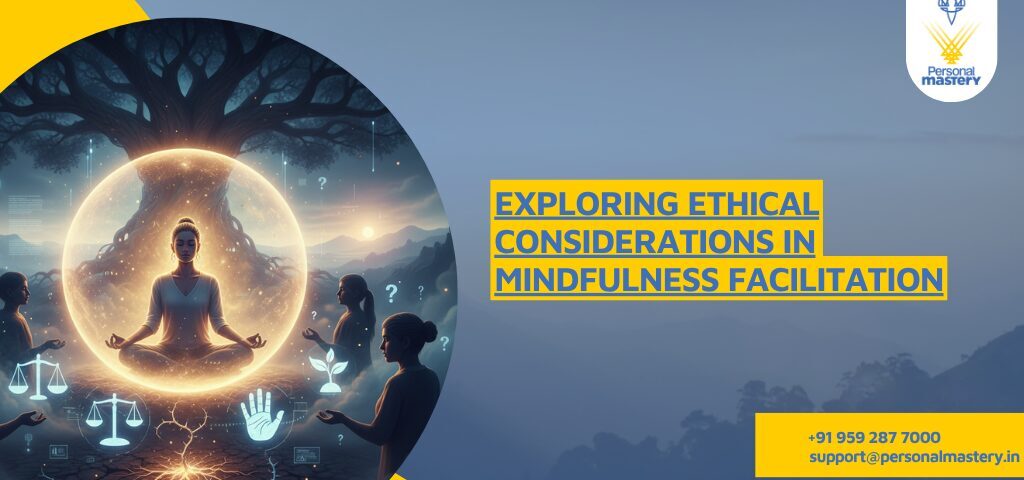
The Growing Demand for Certified Mindfulness Practitioners
November 4, 2025
Developing Self-Awareness Through Mindfulness Techniques
November 10, 2025Just close your eyes for a moment. Visualize that you are presenting yourself to your team — sure of yourself, relaxed, and totally there. Every person in the room directs their gaze toward you, not due to your rank, but because of the presence of the energy you emit — tranquil yet strong.
You start talking, and the audience follows you, not only with their ears but also with their thoughts. This is the influence of a mindful leader — one who doesn't dominate but rather consciously leads. And with mindfulness in leadership comes a responsibility — an ethical one — to act as a mentor to others with awareness, respect and integrity.
Welcome to this exploration of ethical considerations in mindfulness facilitation, especially for those aspiring to lead through influence, perhaps even using subtle hypnosis techniques for transformation.
Before we go deeper, if you’ve ever thought about guiding others through inner awareness, you’ll want to check out the Online Meditation Facilitator Course, the IBPCT Accredited Mindfulness Course, and Live Mindfulness Meditation Classes — all designed to help you Become a Certified Meditation Facilitator and grow through Mindfulness Course for Personal Growth.
 The Scene: When Mindfulness Meets Power
The Scene: When Mindfulness Meets Power
Let’s picture this — you’ve just completed your mindfulness facilitator training. You’re leading your first workshop. People are sitting with eyes closed, trusting your voice to guide them inward. The silence feels sacred, the responsibility enormous.
Now imagine, with a single phrase, you could shift someone’s perception of reality — help them dissolve stress, heal a wound, or break a limiting belief. That’s the beauty — and the danger — of influence.
This is where ethics steps in.
Because mindfulness isn’t about control. It’s about awakening. And hypnosis, when integrated ethically, becomes a bridge — helping others access their subconscious while keeping their autonomy intact.
 Why Ethical Mindfulness Matters in Leadership
Why Ethical Mindfulness Matters in Leadership
In today’s fast-paced corporate world, leaders are no longer just decision-makers — they are emotional anchors. When you use mindfulness in leadership, you’re influencing moods, behaviors, and perspectives.
That’s why every facilitator, coach, or leader must ask:
“Am I empowering or manipulating?”
Ethical mindfulness asks us to lead by liberating, not directing. It’s about planting seeds of awareness, not scripts of dependency.
Even hypnotic leadership — when done ethically — is not about control; it’s about permission. You invite transformation rather than impose it.
When you truly embody this mindset, your leadership becomes magnetic — not because you’re forceful, but because you’re authentic.
 Hypnosis and Mindfulness: The Perfect Ethical Duo
Hypnosis and Mindfulness: The Perfect Ethical Duo
Let’s clear one thing — hypnosis isn’t mind control. (Sorry, Hollywood!)
It’s simply focused awareness — the same quality mindfulness cultivates. When merged together, they create a powerful blend for change, but only when used responsibly.
For example:
A mindful leader might use hypnotic language like:
“As you breathe deeply, notice how your body begins to relax and your thoughts become clearer…”
Sounds familiar? It’s not manipulation — it’s gentle guidance. Ethical facilitation is about creating space for self-discovery.
And that’s where courses like the Online Meditation Facilitator Course or the IBPCT Accredited Mindfulness Course come in — they teach facilitators to use their voice and presence ethically, ensuring the person’s inner world remains their own domain.
 The Ethical Compass for Mindfulness Facilitators
The Ethical Compass for Mindfulness Facilitators
Ethical facilitation isn’t about following rules; it’s about embodying values. Let’s simplify the big, scary word “ethics” into 5 easy guiding principles:
- Integrity Over Impression – Don’t perform mindfulness. Live it.
If you’re not grounded, your guidance becomes hollow. - Consent Over Convincing – Always invite, never impose.
Even subtle hypnotic techniques require awareness and permission. - Transparency Over Tactics – Be open about your methods.
Tell participants what to expect, so trust deepens naturally. - Empowerment Over Dependency – The goal of mindfulness is to make others independent of your voice, not addicted to it.
- Awareness Over Authority – You’re not “fixing” anyone.
You’re simply facilitating their self-discovery — their own inner wisdom.
When you follow this compass, mindfulness facilitation transforms into ethical leadership.
 How Ethical Facilitation Elevates Leadership
How Ethical Facilitation Elevates Leadership
Here’s the secret — ethical mindfulness doesn’t just make you a better facilitator; it makes you a visionary leader.
When a leader practices ethical mindfulness:
- Their communication becomes authentic.
- Their decision-making turns intuitive.
- Their team feels psychologically safe.
And when they blend this with hypnosis techniques (like suggestion, pacing, and reframing), their influence becomes effortless.
For instance, using soft hypnotic phrasing such as:
“As you consider this decision, notice how clarity begins to arise naturally…”
…you’re leading without pushing. You’re creating a mental environment where others choose clarity instead of being told to.
That’s leadership redefined — not by dominance, but by awareness.
 The Role of Training: From Learner to Ethical Leader
The Role of Training: From Learner to Ethical Leader
Now, this doesn’t happen by luck or intuition alone. It requires deep, structured training. That’s why enrolling in the Online Meditation Facilitator Course or Live Mindfulness Meditation Classes becomes crucial.
You’ll learn how to:
- Use your tone, words, and timing ethically.
- Balance influence with respect.
- Integrate mindfulness and hypnosis for leadership transformation.
And with an IBPCT Accredited Mindfulness Course, your practice gains global credibility. Certification is not the only thing that matters. Besides, it is all about being the kind of leader whom people implicitly trust to lead them through their inner lives.
The Mindfulness Course for Personal Growth takes this even further — helping you to build your emotional intelligence, increase self-awareness, and make mindfulness a way of life rather than just a weekend workshop.
 Bringing It All Together
Bringing It All Together
Picture this: You enter a boardroom or a place for discussions with the mind and body in harmony. You don’t try to impress but rather to make an impact with your words.
You apply mindful interruptions, carefully chosen words, and ethical hypnotic power — and all of a sudden, the listeners are not just paying attention; they are experiencing. They are being changed.
This is the result of the combination of ethics and mindfulness in a leadership way — you do not only lead people, but you also make them conscious.
Therefore, if for you, leadership is about awakening potential, not only reaching goals, then this is your call to action. Start your journey with the Online Meditation Facilitator Course, explore the IBPCT Accredited Mindfulness Course, go to Live Mindfulness Meditation Classes, and let the Mindfulness Course for Personal Growth direct your change.
Becoming a Certified Meditation Facilitator is not the only thing you will achieve — you will transform into a conscious influencer of change, a leader who leads through awareness, compassion, and ethical consciousness, and a leader who leads through awareness, compassion, and ethical consciousness.
 Final Thought
Final Thought
Leadership isn’t about leading others into your vision — it’s about helping them discover their own clarity through yours.
And that’s exactly what ethical mindfulness facilitation teaches.
Quote to End With:
“The greatest leader is not necessarily the one who does the greatest things. He is the one that gets people to do the greatest things.” — Ronald Reagan
Contact Us
Phone: +91-9592877000
Email ID: support@personalmastery.in
Address: #748, Sector 9, Panchkula (Chandigarh), Haryana (INDIA) – 134113



 The Scene: When Mindfulness Meets Power
The Scene: When Mindfulness Meets Power Why Ethical Mindfulness Matters in Leadership
Why Ethical Mindfulness Matters in Leadership Hypnosis and Mindfulness: The Perfect Ethical Duo
Hypnosis and Mindfulness: The Perfect Ethical Duo The Ethical Compass for Mindfulness Facilitators
The Ethical Compass for Mindfulness Facilitators How Ethical Facilitation Elevates Leadership
How Ethical Facilitation Elevates Leadership The Role of Training: From Learner to Ethical Leader
The Role of Training: From Learner to Ethical Leader Bringing It All Together
Bringing It All Together Final Thought
Final Thought